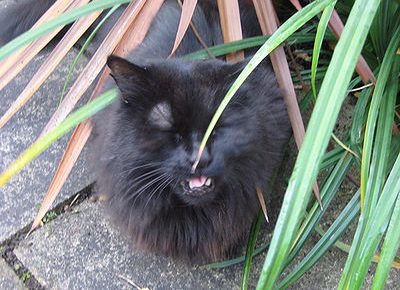Called LAACS (long-acting anticoagulants), they are in use today in many rodenticides.
The pellets are dyed green and while humans can recognize them for what they are, to cats and dogs who have limited color vision, they look like pet food.
LAACS work by blocking the body’s use of Vitamin K which is needed to clot blood. They do not affect clotting material already in the bloodstream which is why there can be a delay of 3-5 days between ingesting the poison and uncontrolled bleeding.
Common anticoagulants found in rodenticides include warfarin, hydroxycoumadin, brodifacoum, bromadiolone, pindone, diphacinone, diphenadione and chlorohiacinone. Warfarin and hydroxycoumadin must be ingested for several days to kill while the others are deadly in one dose.
Heparin, a human medication used to treat clotting disorders is also toxic to pets when accidentally ingested. If you or someone in your household is using this medication, be sure to keep it safely away from pets.
While it usually takes 3-5 days for signs of poisoning to appear, they can appear sooner if the pet continues to be exposed to the poison.
Symptoms of LAACS include lethargy, coughing, accumulation of blood in the lungs causing difficulty breathing, abdominal swelling due to blood, pale gums, vomiting, diarrhea, sudden nosebleeds and bleeding gums and mouth, bruising, bleeding appearing in more than one area. These all point to a problem with blood clotting.
If you live near wooded areas, LAACS may be used to kill raccoons, squirrels or other small animals. Dogs and cats who spend a lot of time outdoors and chase rats, mice and other animals or consume dead animals are at risk for ingesting anticoagulants.
Diagnosis of LAACS poisoning means a medical history as well as recent behavior, blood tests and timing the pet’s blood clotting ability to determine severity.
Treatment involves administering Vitamin K1 (not K3) by injection or orally depending on the situation. The pet may require hospitalization and blood transfusions.
For some ingested rodenticides, there is no cure.
If you do have rodenticides in your home, please make sure they are locked away where pets (and children) cannot reach them.
If you find a dead rodent in your house or garden, remove it to a place where pets cannot reach it. Either have it tested for poison or call the proper authorities to dispose of it.
If you allow your pets outdoors unattended, please reconsider.
If you suspect that your pet has been poisoned, even if showing no symptoms, have him/her tested by a vet ASAP. the sooner action is taken, the better the prognosis.


